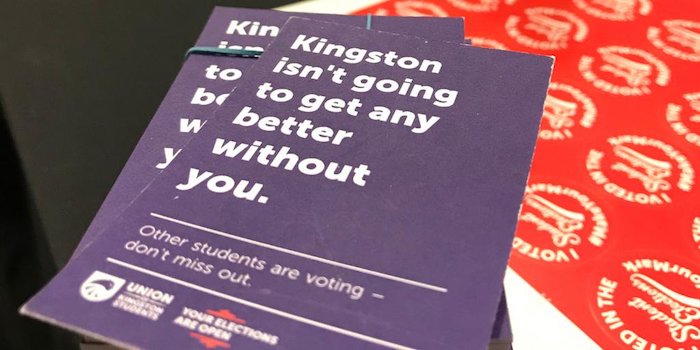Only six per cent of students turned out to vote in last week’s re-run of the Kingston Union election following the introduction of new campaign rules.
A paper ballot was used as opposed to the usual online voting system to better protect the privacy of students when voting.
Steph Johnson, representation coordinator for Union of Kingston Students, said: “There is not a concern that fewer people voted in the election, 1036 students is actually quite an impressive turnout for a paper ballot if you compare with other student unions across the country who run paper ballot elections.”
Johnson also said that the reality of keeping a ballot station running meant that voting hours had to be restricted to between 9 a.m. and 5 p.m.
“That was bound to result in a lower number of votes but was absolutely crucial in order to not cause candidates any extra stress,” she said.
By contrast, over 2000 students voted in the annulled election last month. This year’s figure also pales in comparison to 2017 when there was a record high turnout of 3,714 voters (20 per cent of the student population).
Some candidates were dismayed at the decision to adopt a paper ballot.
During the campaign, Dagmara Krzysztofiak, former candidate for NUS delegate, said: “I definitely think that paper ballots are going to slow down the elections. And having the postal vote? That’s just funny.
“I guess it takes off a lot of pressure [for students] but at the same time there are going to be fewer people voting. Will that reflect the entire campus then? I don’t believe so,” she said.
The election, which originally took place last month, had to be rerun after dozens of complaints were upheld regarding the behaviour of several candidates.
The independent returning officer (IRO), who oversaw the voting process, said: “There is significant evidence that voters were not given sufficient privacy when approached by candidates, and that undue pressure was put on students to vote a specific way.
“Because of this, the election cannot be judged as free and fair by any reasonable individual.”
Many of the complaints pertained to campaigners standing beside voters as they used their phones to cast their vote.
However, this was contested by some of the candidates.
Feisal Haji, new union president and NUS delegate, said that he believes candidates weren’t cheating but instead helping students navigate a complex website so they could vote.
“Our union website is not fit for purpose. If you have never used it before, it’s a nightmare. Personally, I would direct them to a staff member who could help.
“The vast majority of complaints were frivolous. Some candidates were trying to get others disqualified – they were people who realised they weren’t going to win.”
However, the IRO dismissed these rebuttals in the report submitted to the union. He said: “There was ample independent support to help students if they were confused.
“Moreover, the platform used by Kingston SU is used successfully by a significant number of other organisations, and I do not find anything materially at fault with it.”
The IRO decided to rerun the election rather than disqualify those found to have broken the rules.
Abigail Grant, new trustee and NUS delegate, was one of 13 candidates who petitioned to have this changed.
“We wanted the people who there were multiple complaints against and the people who should have been disqualified in the first election to not be allowed to run again in this election. It’s unfair on all the candidates who followed the rules.”
The rerun eventually went ahead without any disqualifications.
You can find the names of your new Kingston Union representatives here.





